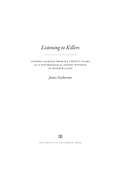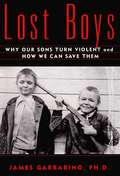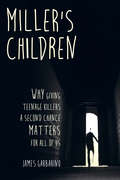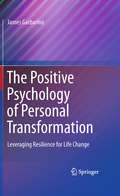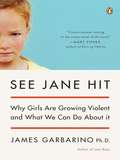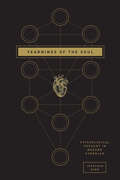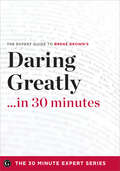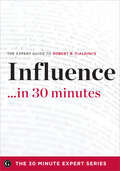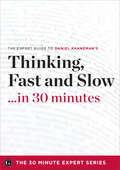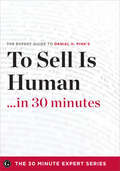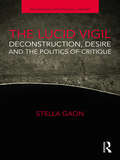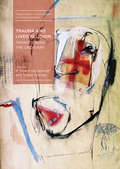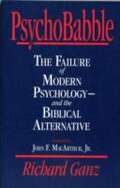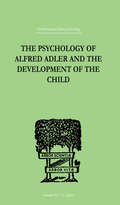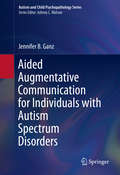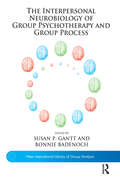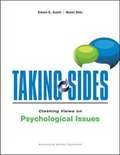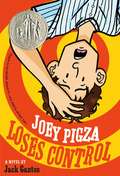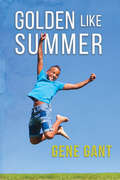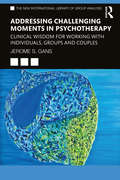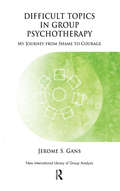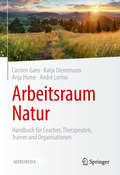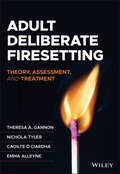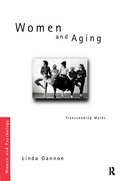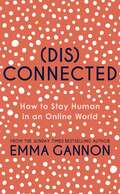- Table View
- List View
Listening to Killers
by James GarbarinoListening to Killers offers an inside look at twenty years' worth of murder files from Dr. James Garbarino, a leading expert psychological witness who listens to killers so that he can testify in court. The author offers detailed accounts of how killers travel a path that leads from childhood innocence to lethal violence in adolescence or adulthood. He places the emotional and moral damage of each individual killer within a larger scientific framework of social, psychological, anthropological, and biological research on human development. By linking individual cases to broad social and cultural issues and illustrating the social toxicity and unresolved trauma that drive some people to kill, Dr. Garbarino highlights the humanity we share with killers and the role of understanding and empathy in breaking the cycle of violence.
Lost Boys: Why Our Sons Turn Violent and How We Can Save Them
by James GarbarinoIn the first book to help parents truly understand youth violence and stop it before it explodes, national expert Dr. James Garbarino reveals how to identify children who are at risk and offers proven methods to prevent aggressive behavior. After more than a decade of relentless increase in the urban war zones of large cities, violence by young boys and adolescents is on the rise in our suburbs, small towns, and rural communities. Twenty-five years as a psychologist working in the trenches with such children has convinced James Garbarino that boys everywhere really are angrier and more violent than ever before. In light of the recent school-based shootings, it's now clear that no matter where we live or how hard we try as parents, chances are our children are going to school with troubled boys capable of getting guns and pulling triggers. Beyond the deaths and debilitating injuries that result from this phenomenon are the staggering psychological costs -- children who are afraid to go to school, teachers who are afraid of their students, and parents who fear for their children's lives. Building on his pioneering work, Garbarino shows why young men and boys have become increasingly vulnerable to violent crime and how lack of adult supervision and support poses a real and growing threat to our children's basic safety. For these vulnerable boys, violence can become normal, the "right thing to do. " Terry, one of the boys Garbarino interviews, says "I just wasn't gonna take it anymore. I knew I would have to pay the price for what I did, but I didn't care. " We've seen how the deadly combination of ignoring excessively bad behavior and allowing easy access to guns has destroyed families in Pennsylvania, Oregon, New York, Washington, Kentucky, and Arkansas. Fortunately, parents can spot troubled boys and take steps to protect their families from violence if they know what signs to look for -- lack of connection, masking emotions, withdrawal, silence, rage, trouble with friends, hypervigilance, cruelty toward other children and even animals -- all warning signs that every parent and peer can recognize and report. Dr. Garbarino, whom Dr. Stanley Greenspan of the National Institute of Mental Health hails as "one of the true pioneers in our understanding of the inner life of our youth," addresses the wide range of issues that boys of every temperament and from every background may have to confront as they grow and develop. By outlining the steps parents, teachers, and public officials can take to keep all children safer, Dr. Garbarino holds out hope and solutions for turning our kids away from violence, before it is too late. This is one of the most important and original books ever written about boys.
Miller's Children: Why Giving Teenage Killers A Second Chance Matters For All Of Us
by James GarbarinoMiller’s Children is a passionate and comprehensive look at the human consequences of the US Supreme Court’s decision in the case of Miller v. Alabama, which outlaws mandatory life-without-parole sentences for juvenile murderers. The decision to apply the law retroactively to other cases has provided hope to those convicted of murders as teenagers and had been incarcerated with the expectation that they would never leave prison until their own death as incarcerated adults. Psychological expert witness James Garbarino shares his fieldwork in more than forty resentencing cases of juveniles affected by the Miller decision. Providing a wide-ranging review of current research on human development in adolescence and early adulthood, he shows how studies reveal the adolescent mind’s keen ability for malleability, suggesting the true potential for rehabilitation. Garbarino focuses on how and why some convicted teenage murderers have been able to accomplish dramatic rehabilitation and transformation, emphasizing the role of education, reflection, mentoring, and spiritual development. With a deft hand, he shows us the prisoners’ world that is filled, first and foremost, with stories of hope amid despair, and moral and psychological recovery in the face of developmental insult and damage.
The Positive Psychology of Personal Transformation
by James GarbarinoThis book reveals the social basis for moral development in adversity, and the mental and physical benefits of psychological and spiritual growth. Drawing widely on the author's experiences, the book has vast significance across the healing disciplines.
See Jane Hit
by James GarbarinoFrom one of America's leading authorities on juvenile violence comes a groundbreaking investigation of the explosion of violent behavior in girls With Lost Boys, James Garbarino became our foremost explicator of violent behavior in boys. Now he turns his attention to its increasing incidence in girls. Twenty-five years ago, ten boys were arrested for assault for every one girl. Now that ratio is four-to-one and dropping. Combining clinical experience with incisive analyses of social trends, Garbarino traces the factors--many of them essentially positive--behind the epidemic: girls' increased participation in sports and greater comfort with their physicality, but also their lack of training in handling aggression. See Jane Hit goes beyond diagnosing the problem to outline a clear-eyed, compassionate solution.
Yearnings of the Soul
by Jonathan GarbIn Yearnings of the Soul, Jonathan Garb uncovers a crucial thread in the story of modern Kabbalah and modern mysticism more generally: psychology. Returning psychology to its roots as an attempt to understand the soul, he traces the manifold interactions between psychology and spirituality that have arisen over five centuries of Kabbalistic writing, from sixteenth-century Galilee to twenty-first-century New York. In doing so, he shows just how rich Kabbalah's psychological tradition is and how much it can offer to the corpus of modern psychological knowledge. Garb follows the gradual disappearance of the soul from modern philosophy while drawing attention to its continued persistence as a topic in literature and popular culture. He pays close attention to James Hillman's "archetypal psychology," using it to engage critically with the psychoanalytic tradition and reflect anew on the cultural and political implications of the return of the soul to contemporary psychology. Comparing Kabbalistic thought to adjacent developments in Catholic, Protestant, and other popular expressions of mysticism, Garb ultimately offers a thought-provoking argument for the continued relevance of religion to the study of psychology.
Daring Greatly in 30 Minutes: The Expert Guide to Brene Brown's Critically Acclaimed Book
by Garamond PressDaring Greatly ...in 30 minutes is the essential guide to quickly understanding the life-changing lessons outlined in Brené Brown's best-selling book, Daring Greatly: How the Courage to Be Vulnerable Transforms the Way We Live, Love, Parent, and Lead. In Daring Greatly, Brené Brown argues that by learning to be vulnerable, people can find deeper connections with the people around them and improve their relationships. Daring Greatly aims to prove that vulnerability is not a negative trait, but that we should have the courage to embrace imperfections if we want to be content and live a more fulfilling life. Daring Greatly posits that if people can learn to practice vulnerability, they can find deeper connections in their relationships—and, perhaps most important, they can establish compassionate and loving relationships with themselves. Understand the key ideas of Daring Greatly in a fraction of the time, with tools such as: Concise synopsis, which examines the principles of Daring Greatly In-depth analysis of key concepts from Daring Greatly, including an explanation of the "Wholehearted," shame resilience, and embracing vulnerability Insightful background on thought leader Brené Brown and the origins of Daring Greatly Key takeaways for utilizing Brown's theories to live a worthy, connected, and authentic life Extensive recommended reading list and bibliography relevant to Daring Greatly As with all books in the 30 Minute Expert Series, this book is intended to be purchased alongside the reviewed title, Daring Greatly: How the Courage to Be Vulnerable Transforms the Way We Live, Love, Parent, and Lead.
Influence in 30 Minutes: The Expert Guide to Robert B. Cialdini's Critically Acclaimed Book
by Garamond PressInfluence ...in 30 minutes is your guide to quickly understanding the important lessons on influencing human behavior covered in the best seller, Influence: The Psychology of Persuasion. In Influence: The Psychology of Persuasion, Dr. Robert B. Cialdini uses decades of research and experiments to offer insight into the psychology of human decision-making, and the world of influence and persuasion. In Influence, Cialdini reveals invaluable tools for everyone from consumers to professional salespeople, including how to become a skilled persuader and how to counteract manipulation. Widely praised for its practical knowledge, Influence: The Psychology of Persuasion is incredibly useful for anyone seeking to understand the psychology behind why people say yes. Use this helpful guide to understand Influence in a fraction of the time, with tools such as: Fundamentals of how to harness the power of persuasion to influence others Practical applications for using the "six weapons of influence" to move others to say yes Techniques for defending against manipulation tactics used by advertisers, salespeople, swindlers, or even friends and colleagues Intriguing case studies, a brief synopsis, and definitions of key terms from Influence As with all books in the 30 Minute Expert Series, this book is intended to be purchased alongside the reviewed title, Influence: The Psychology of Persuasion.
Thinking, Fast and Slow in 30 Minutes: The Expert Guide to Daniel Kahneman's Critically Acclaimed Book
by Garamond PressThinking, Fast and Slow ...in 30 minutes is the essential guide to quickly understanding the important lessons on decision-making outlined in the New York Times best seller Thinking, Fast and Slow. In Thinking, Fast and Slow, author Daniel Kahneman gets to the bottom of how to make good decisions and when to trust your intuition. Kahneman wants readers to avoid putting too much weight on acting quickly on their intuition when making decisions. He presents the concept of humans "thinking fast and slow"—the idea that human thought can be divided into two categories: slow and painstaking thought, and quick, intuitive thought. Through detailed research and real-life examples, Thinking, Fast and Slow teaches readers when to apply each type of thought in order to improve everything from playing the stock market to increasing personal happiness. Thinking, Fast and Slow will change the way you think, and improve the quality of your decisions, both large and small. Understand the key ideas of Thinking, Fast and Slow in a fraction of the time, with tools such as: A concise synopsis examining the principles of Thinking, Fast and Slow In-depth analysis of key concepts behind Thinking, Fast and Slow: the two selves, and the two distinct thinking systems—the intuitive System 1 and the effortful System 2 Illustrative case studies demonstrating Kahneman's groundbreaking research in behavioral economics Real-world applications for applying the theories in Thinking, Fast and Slow to everyday life Critical reception to Thinking, Fast and Slow, highlighting important arguments by major publications and thought leaders As with all books in the 30 Minute Expert Series, this book is intended to be purchased alongside the reviewed title, Thinking, Fast and Slow.
To Sell Is Human in 30 Minutes: The Expert Guide to Daniel H. Pink's Critically Acclaimed Book (30 Minute Expert Summaries Ser. #12)
by Garamond PressTo Sell Is Human ...in 30 minutes is the essential guide to quickly understanding the important sales lessons outlined in Daniel H. Pink's best-selling book, To Sell Is Human: The Surprising Truth About Moving Others. In To Sell Is Human, renowned author Daniel H. Pink contends that the line between seller and customer has blurred, and that everyone, no matter their occupation, spends most of their time selling something to somebody else, whether it's a product, an idea, or an agenda. Pink breaks down the science of selling effectively, pulling from extensive research on the psychology of persuasion. To Sell Is Human is an invaluable resource for improving your ability to successfully move others in your professional and personal life. Use this helpful guide to understand To Sell is Human in a fraction of the time, with tools such as: Concise synopsis examining the key principles of To Sell Is Human In-depth analysis of the new ABCs of sales (Attunement, Buoyancy, and Clarity) Breakdown of how to create a successful pitch Lessons on applying important sales concepts from To Sell is Human in personal and professional contexts As with all books in the 30 Minute Expert Series, this book is intended to be purchased alongside the reviewed title, To Sell Is Human: The Surprising Truth About Moving Others.
The Lucid Vigil: Deconstruction, Desire and the Politics of Critique (Psychoanalytic Political Theory)
by Stella GaonStella Gaon provides the first fully philosophical account of the critical nature of deconstruction, and she does so by turning in an original way to psychoanalysis. Drawing on close readings of Freud and Laplanche, Gaon argues that Derridean deconstruction is driven by a normative investment in reason’s psychological force. Indeed, deconstruction is more faithful to the principle of reason than the various forms of critical theory prevalent today. For if one pursues the classical demand for rational grounds vigilantly, one finds that claims to ethical or political legitimacy cannot be rationally justified, because they are undone by logical undecidability. Gaon’s argument is borne out in the cases of Kantian deontology, Deweyan pragmatism, progressive pedagogy, Habermasian moral theory, Levinasian ethics and others. What emerges is the groundbreaking demonstration that deconstruction is impelled by a quasi-ethical critical drive, and that to read deconstructively is to radicalize the emancipatory practice of reason as self-critique. This important volume will be of great value to critical theorists as well as to Derrida scholars and researchers in social and political thought.
Trauma and Lived Religion: Transcending the Ordinary (Palgrave Studies in Lived Religion and Societal Challenges)
by R. Ruard Ganzevoort Srdjan SremacThis book focuses on the power of the ‘ordinary’, ‘everydayness’ and ‘embodiment’ as keys to exploring the intersection of trauma and the everyday reality of religion. It critically investigates traumatic experiences from a perspective of lived religion, and therefore, examines how trauma is articulated and lived in the foreground of people’s concrete, material actualities. Trauma and Lived Religion seeks to demonstrate the vital relevance between the concept of lived religion and the study of trauma, and the reciprocal relationship between the two. A central question in this volume therefore focuses on the key dimensions of body, language, memory, testimony, and ritual. It will be of interest to academics in the fields of sociology, psychology, and religious studies with a focus on lived religion and trauma studies, across various religions and cultural contexts.
Psychobabble: The Failure of Modern Psychology -- and the Biblical Alternative
by Richard GanzWhy is it many evangelical preachers shout from the pulpit about God's power, but they shuffle their emotionally troubled members off to the closest therapist? Both church leaders and laypersons seem to believe that the psychological "experts" have the answers for the wounded hearts and souls of God's people. And when churches do offer counseling, it often is tinged with the secular psychology and psychotherapy that have infiltrated the church. <p><p> Psychobabble explains the dichotomy between secular and Biblical counseling and shows the danger of incorporating secular techniques into a Christian approach. This book will arm believers looking for Scriptural answers to the hurts of a broken world. As anti-Christian bias becomes increasingly pervasive in secular psychology, the church must look to the true source of all healing. This book will point the way.
The Psychology Of Alfred Adler: and the Development of the Child (International Library Of Psychology Ser.)
by Ganz, MadelaineFirst Published in 1999. Routledge is an imprint of Taylor & Francis, an informa company.
Aided Augmentative Communication for Individuals with Autism Spectrum Disorders (Autism and Child Psychopathology Series)
by Jennifer B. GanzJust as autism is a continuum of disorders, it is associated with a broad range of neurodevelopmental, social, and communication deficits. For individuals with autism spectrum disorders (ASD), augmentative and alternative communication (AAC) has a major impact on their daily lives, often reducing the occurrence of challenging behaviors. Aided Augmentative Communication for Individuals with Autism Spectrum Disorders is a practical guide to the field, offering readers a solid grounding in ASD, related complex communication needs (CCN), and AAC, especially visual and computer-based technologies. Widely used interventions and tools in AAC are reviewed--not just how they work, but why they work--to aid practitioners in choosing those most suited to individual clients or students. Issues in evaluation for aided AAC and debates concerning its usability round out the coverage. Readers come away with a deeper understanding of the centrality of communication for clients with ASD and the many possibilities for intervention Key areas of coverage include: AAC and assessment of people with ASD and CCN. Interdisciplinary issues and collaboration in assessment and treatment. AAC intervention mediated by natural communication partners. Functional communication training with AAC. The controversy surrounding facilitated communication. Sign language versus AAC. Aided Augmentative Communication for Individuals with Autism Spectrum Disorders is an essential resource for clinicians/practitioners, researchers, and graduate students in such fields as child and school psychology, speech pathology, language education, developmental psychology, behavior therapy, and educational technology.
The Interpersonal Neurobiology of Group Psychotherapy and Group Process (The New International Library of Group Analysis)
by Susan P. Gantt Bonnie BadenochMight it be possible that neuroscience, in particular interpersonal neurobiology, can illuminate the unique ways that group processes collaborate with and enhance the brain's natural developmental and repairing processes? This book brings together the work of twelve contemporary group therapists and practitioners who are exploring this possibility through applying the principles of interpersonal neurobiology (IPNB) to a variety of approaches to group therapy and experiential learning groups. IPNB's focus on how human beings shape one another's brains throughout the life span makes it a natural fit for those of us who are involved in bringing people together so that, through their interactions, they may better understand and transform their own deeper mind and relational patterns. Group is a unique context that can trigger, amplify, contain, and provide resonance for a broad range of human experiences, creating robust conditions for changing the brain.
Taking Sides: Clashing Views on Psychological Issues Expanded
by Edwin E. Gantt Brent SlifeThe Taking Sides Collection on McGraw-Hill Create(tm) includes current controversial issues in a debate-style format designed to stimulate student interest and develop critical thinking skills.
Joey Pigza Loses Control: Grades 4-6 (Joey Pigza #2)
by Jack GantosThe sequel to Joey Pigza Swallowed the Key, a National Book Award Finalist.When Joey Pigza meets his dad for the first time in years, he meets a grown-up version of his old out-of-control self. Carter Pigza is as wired as Joey used to be -- before his stint in special ed, and before he got his new meds. Joey's mom reluctantly agrees that he can stay with his dad for a summer visit, which sends Joey racing with sky-high hopes that he and Carter can finally get to know each other. But as the weeks whirl by, Carter has bigger plans in mind. He decides that just as he has pulled himself up by his own bootstraps, Joey can do the same and become as normal as any kid, without the help of a doctor's prescription. Carter believes Joey can do it and Joey wants to believe him more than anything in the world.Here is the continuation of the acclaimed Joey Pigza story, affirming not only that Joey Pigza is a true original but that it runs in the family.Joey Pigza Loses Control is a 2000 New York Times Book Review Notable Children's Book of the Year and a 2001 Newbery Honor Book.
Golden Like Summer
by Gene GantCan two teens with everything stacked against them find love and happiness when doing the right thing leads to persecution? Held captive and sexually abused by a sadistic criminal, Joey rescued a younger boy when he got his chance to escape. But instead of being applauded for his bravery, he’s accused of hurting the boy and sees firsthand how unfair the system can be to someone young, poor, and black. He flees to an abandoned house, renames himself Alan, and shares his new life with Desi, another homeless youth. Desi is deeply attracted to Alan, and Alan feels the same, even if his past has tainted those feelings. While trying to let go of his past, Alan discovers that Desi isn’t free, chased by the older teen who’s been pimping him out. Alan intends to change that, but doing the right thing and confronting Desi’s pimp may put Alan on the wrong side of the law once again.
Addressing Challenging Moments in Psychotherapy: Clinical Wisdom for Working with Individuals, Groups and Couples (The New International Library of Group Analysis)
by Jerome S. GansThis practical and helpful volume details how clinicians can work through various common challenges in individual, couple, or group psychotherapy. Chapters draw upon clinical wisdom gleaned from the author’s 48 years as a practicing psychiatrist to address topics such as using countertransference for therapeutic purposes; resistance, especially when it needs to be the focus of the therapy; and a prioritization of exploration over explanation. Along with theory and clinical observations, Dr.Gans offers a series of "Clinical Pearls," pithy comments that highlight different interventions to a wide range of clinical challenges. These include patient hostility, the abrupt and unilateral termination of therapy, the therapist’s loss of compassionate neutrality when treating a couple, and many more. Many of the "Clinical Pearls" prioritize working in the here-and-now. In addition to offering advice and strategies for therapists, the book also addresses concerns like the matter of fees in private practice and the virtue of moral courage on the part of the therapist. Written with clarity, heart, and an abundance of clinical wisdom, Addressing Challenging Moments in Psychotherapy is essential reading for all clinicians, teachers, and supervisors of psychotherapy.
Difficult Topics in Group Psychotherapy: My Journey from Shame to Courage (The New International Library of Group Analysis)
by Jerome GansThis book contains eleven selected papers on difficult topics group therapists encounter in their work. Based on the author's forty years in the field, these papers include the topics of shame, courage, hostility, combined individual and group therapy, money, indirect communication, difficult patients, silence, and the missed session. Written from a psychodynamic orientation with a relational emphasis, they pay special attention to countertransference. An autobiographical introduction to each paper discusses what experiences have led the author to write on each topic. These introductions honor the role that personal experience has played in the evolution of Dr Gan's therapeutic presence.
Arbeitsraum Natur: Handbuch für Coaches, Therapeuten, Trainer und Organisationen
by Carsten Gans Katja Dienemann Anja Hume André LorinoAls Nachschlagewerk und Praxishandbuch dient das Buch professionellen Coaches, Therapeuten und Trainern, die die Natur als förderlichen Faktor für ihre Arbeit kennenlernen und integrieren möchten. Der aktuelle Trend nach mehr Nähe zur Natur kann so mit „Arbeitsraum Natur“ in den professionellen Coaching-, Therapie-, Trainings- oder Business-Bereich Einzug halten. Das Buch liefert für diesen Zweck ein umfangreiches Fundament und stellt die Möglichkeiten eines natürlichen Arbeitsumfelds mit seinen besonderen Vorteilen, Methoden und Spezialisierungen vor.
Adult Deliberate Firesetting: Theory, Assessment, and Treatment (Wiley Series in Forensic Clinical Psychology)
by Theresa A. Gannon Nichola Tyler Caoilte Ó Ciardha Emma AlleyneADULT DELIBERATE FIRESETTING Explore the theoretical foundations of—and discover effective treatment options for—adults who deliberately set fires In Adult Deliberate Firesetting: Theory, Assessment, and Treatment, a team of distinguished researchers deliver a comprehensive exploration of individuals who intentionally set fires. The book covers major theories on the motivations and processes involved in firesetting, as well as the assessment and treatment of patients and clients who demonstrate this behaviour. The treatment portion of the book focuses on a strengths-based rehabilitative approach that rests on the assumption that criminogenic and human needs are inextricably intertwined. Readers will find common challenges faced by practitioners in recruiting and facilitating group-based treatment for people who have set fires. Readers will also benefit from the inclusion of: A thorough introduction to deliberate firesetting, including its definitions, terms, and labels Comprehensive explorations of the key characteristics and clinical features of people who deliberately set fires Practical discussions of theories of deliberate firesetting, including effective psychological theory and typological explanations of firesettings In-depth examinations of best practice risk assessments in defendants, and patients who deliberately set fires Perfect for psychology researchers and practitioners, Adult Deliberate Firesetting: Theory, Assessment, and Treatment will also earn a place in the libraries of psychiatrists, forensic psychologists, social workers, and others involved in the assessment and treatment of adults.
Women and Aging: Transcending the Myths (Women and Psychology)
by Linda R. GannonAging in women has traditionally been defined by the menopause, however it is often social and economic changes which are more important to women.In Aging in Women Linda Gannon redresses the balance. From a feminist perspective, she critically reviews current research and provides a more comprehensive analysis of the psychological effects of life-span changes for older women. Some of the topics she explores include second careers, empty-nest, divorce, chronic illness, retirement and sexuality.
Disconnected: How to Stay Human in an Online World
by Emma GannonPRE-ORDER NOW: The new book by Sunday Times bestselling author, Emma Gannon I love Emma Gannon's wise and refreshing perspective on work, and more broadly on the challenges of building a meaningful life in an era of distraction, overwhelm and uncertainty. - Oliver Burkeman, New York Times Bestselling author of Four Thousand Weeks__________Millennials might have grown up online but now they want to log off. And it's not just millennials. A year of lockdowns, Zoom meetings and reduced physical contact has made us more dependent on the internet than ever before - but has it lost its humanity? Our focus on community and real connection has been sent off-course and we're becoming more aware of how the algorithm manipulates us and how our data has made us a product to be sold. So, where do we go from here and how can we get back on track? (Dis)connected examines these topics and offers tangible tips and advice for those of us who might feel a little lost right now and want to find themselves again.__________Emma Gannon is a cordial and provocative spirit. Read her, listen to her, explore her world and the world at large through her eyes. Hers is a journey well worth taking. - Julia Cameron, New York Times Bestselling author of The Artist's Way
